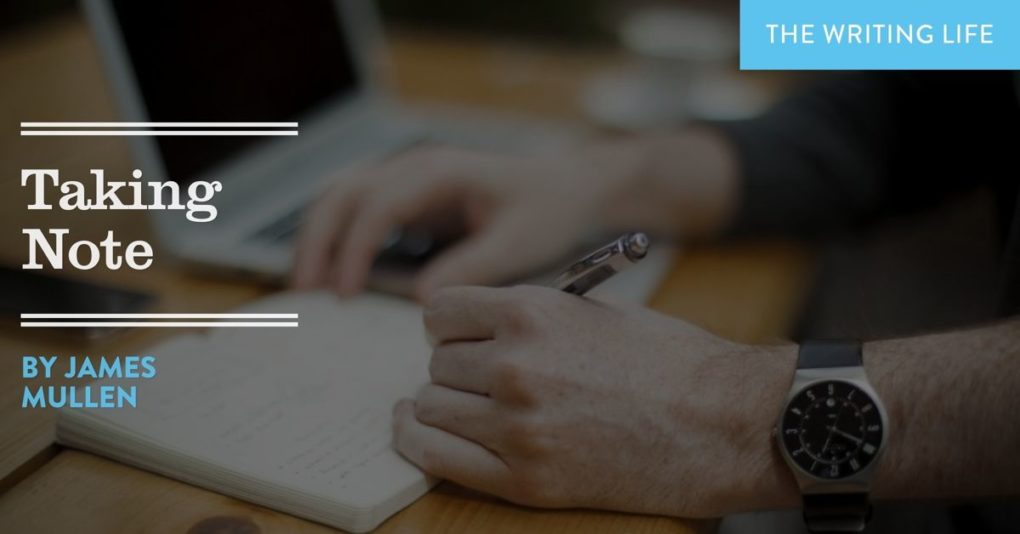by James Mullen
Turner Field in Atlanta, June 1995, I scribbled a note on my knee just before the first pitch:
Mike Deveraux, former legendary Braves player, is sitting behind us. The man next to him asks him to extend his hand as far away from his body as possible so he can take a close-up photo of the finger that has his World Series ring. Deveraux is gracious, smiles, but asks the man if he wants a photo standing with him as well. The fan says no, he just wants a photo of the ring. Mike Deveraux was a big reason the Braves won the Series. I only hope the guy with the camera doesn’t see any adult movie stars during the game.
Red Smith, the legendary NY Times sports writer, reportedly said that writing involves sitting down with a typewriter and opening a vein. But before the bleeding starts, I think certain aspects of writing can be fun, and those aspects will be different for each of us. I hate outlining and knotting up the plot threads. You may love doing that. I enjoy diving deep into the settings and characters, and you may find that tedious or difficult.
Although it took two books for me to learn that story is paramount and everything else must service the story, I still like to spend some time outside the actual “bleeding” to observe day-to-day life, then writing down its quirks as things happen. I’m not Studs Terkel. I don’t write non-fiction. I’m not collecting people’s stories or observations as an end, but I’ve often thought that when I’ve read a beautiful piece of business like Dennis Lehane’s The Drop: “…it felt like heartbreak to him. Like a calendar page no one bothered to turn anymore.” Or James Lee Burke’s Burning Angel: “He pinched his temples with his fingers, as though a piece of rusty wire were twisting inside his head.” Or James Crumley’s The Right Madness: “…he walked like a man who had just discovered his feet.” Lee Child in Never Go Back spends two pages explaining how to know if the grill man in a diner is the establishment’s owner. I am a poor relation to those writers, but I can’t help but wonder. Did Lehane write that after looking at a calendar, and Burke from looking out the window at a wire fence from his Montana ranch? How often did Crumley observe people’s ambulation, and how much time did Lee Child spend in a diner?
It is interesting that writing is so interior, but much of its birth is formed from the outside. For example, I saw a man saunter into a North Carolina diner, sit on a stool, and ask for a “medium” glass of water. Not large, not small, not a glass of water, but one that was medium. A man of precision in thought and language? That may add a nice bit of texture to a story character. Several weeks ago I listened to a priest encourage us to “understand the mystery,” and this morning, a news correspondent reported that “everyone in the White House knew the secret.” Hmm, the opposites of my diner friend. A character using imprecise or confusing language may foster a misunderstanding that could lead to a confusing but interesting scenario?
I’ve found over the years a pen or pencil and a sheet of paper is best for writing down things on the fly. If worthy, I then log it into a notebook. I’m not a Luddite, but I have found using computer files for the notes is time-consuming. With computers, I have mistitled, put ideas in the wrong files, and yes, lost files, so I have surrendered to the familiar piece of paper. Right now I have five spiral notebooks, listed by similes, dialogue, settings, names (yes, there really is someone with the first name of “Zipper”), and long and short descriptions. We’re all different. You may prefer the ease and portability of a Smartphone or IPad, but works better for me – I don’t have to back-up a spiral notebook.
People have amazing stories, and if approached with care, will sometimes tell them. Non-judgement, openness, and conversational trust has to be present. You wouldn’t walk up to strangers and ask first thing, “Do you like church?” or “Were you shot or blown up?” I have – respectively, at a church event and the waiting room at a Veterans hospital (it always pays to smile.) If you question too aggressively or appear to be overly inquisitive, they may look at you like you’re a pickpocket seeking work. But most times, once you start talking, people are flattered you’ve shown an interest and will freely discuss their jobs, families, hobbies, and where they live. Many married couples, especially if older, will give wonderful, funny, and sometimes heart-wrenching stories on how they met. They find joy in the re-telling. Eventually, I will explain that I am a humble writer and ask permission to use those elements in a story – even if in a different form.
But you never know – sometimes a fun and interesting occasion will turn out differently. One afternoon I was on a flight from Boston to Chicago. I introduced myself to the man sitting next to me and engaged in small talk. After discussing sports and weather, I explained where I was going and why. He told me the purpose of his trip. He was on his way back to California, having failed to secure last-ditch financing for his energy consulting firm. He told me he would need to declare bankruptcy and dissolve the company, lay off his staff of twenty, and in all likelihood, loose his wife. He spoke with a calm voice, but he very methodically told me about his employees and their families, and the hardship the unemployment would cause. He talked almost non-stop, as if the words would burn through his depression and sense of failure. I just listened and didn’t ask questions. I didn’t take notes.
We exited the plane in O’Hare and went to our respective connecting gates. I didn’t know what to say, but I whispered luck as I grasped his arm on the jetbridge. I realized that sometimes there are more important things than writing and taking notes. While on the journey to find words and ideas, that experience may change other things as well.
Thanks, James, for the post! I’m always surprised how many ideas I get from the outside world (and I generally like staying at home!) How about everyone else? Have you ever engaged in conversations to find out others’ stories? Have you come across characters or settings that made it into your books?
 James Mullen is living the life of leisure just outside Raleigh, North Carolina. He is an author of two Boston based crime novels: Ketchum and Cobb and Boston Harbors Murder. With fits and starts, he is on a third one. His blog, Grumpy Gets Better, has been in existence since 2009.
James Mullen is living the life of leisure just outside Raleigh, North Carolina. He is an author of two Boston based crime novels: Ketchum and Cobb and Boston Harbors Murder. With fits and starts, he is on a third one. His blog, Grumpy Gets Better, has been in existence since 2009.
Writer James Mullen on finding inspiration (and taking notes) on the go: Share on X
Photo on Visual hunt

That man on the plane had a very sad story. As writers we need to notice the details and yet remember to be sympathetic and caring human beings as well.
Thanks Alex, couldn’t agree more.
Thanks for the post, Jim! It’s a good reminder to me to go out and find inspiration…I’m far too fond of staying at home.
This is really interesting. Thanks, both. It is important to keep eyes and ears open, and have some way of noting the things we learn. I’ve found that sometimes, it’s really helpful just to be willing to listen.
And fun too!
Hi Elizabeth and Jim – I’m so glad you reached out to that guy … and I feel it will have a happy ending – I sure hope it did. Talking to people – they usually open up … and one can find out more and learn so much about other walks of life … everyone has their story … or a story or two. Cheers Hilary
Yes-well said. Everyone really does have a story or a different take on things. Albeit not always one we can (or should) use as writing ideas like the man on the plane. It does seem, though, that some folks open up when they travel. I just finished a cruise last week, and one night at dinner the elderly man next to me told me his life story- when he retired, what his monthly retirement stipend was to an exact amount, how he hated wearing a tie when he was promoted to management, and that his grandchildren never appreciated him cooking breakfast for them-all before he he took his second breath. What a wonder we are.
I enjoyed your narrative about your cruise experience. I also have met many people who are very similar to this gentleman you wrote about. We have a friend who will tell you a similar story and a week later he will tell us the identical story. I hope his wife is a good listener.
I hope so, too, Jack!